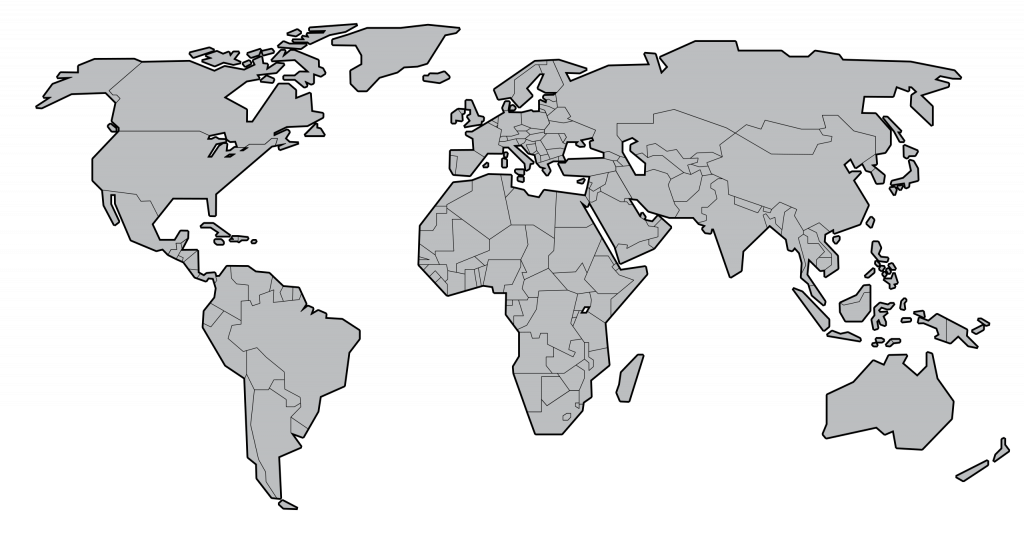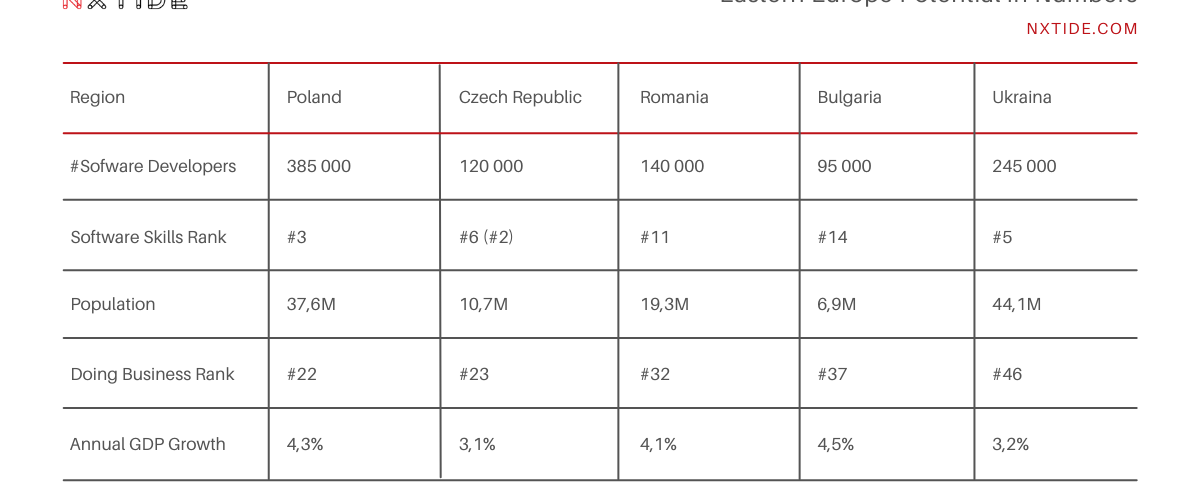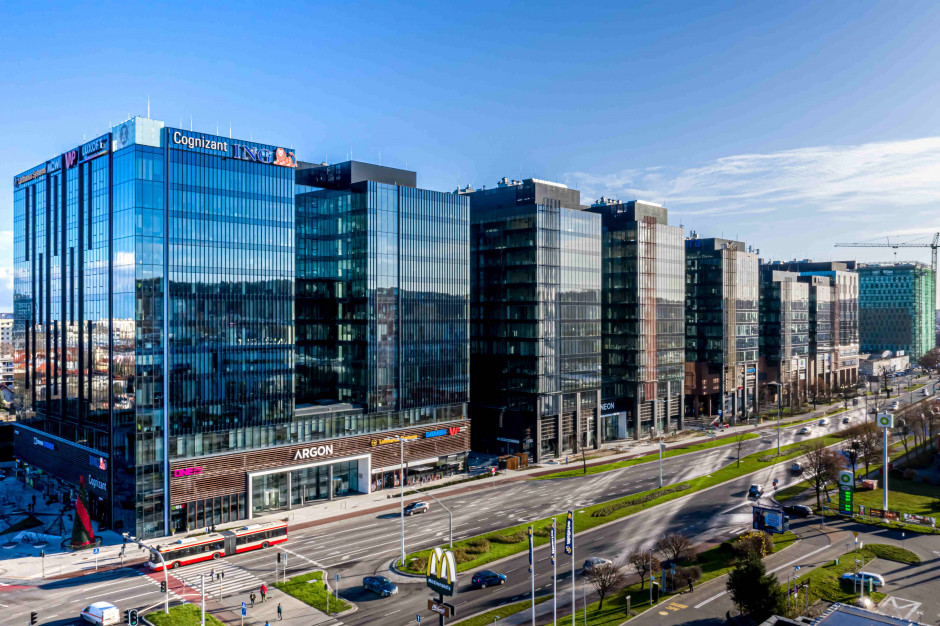Opening a Nearshore Development Office in Poland – a Practical Guide.

Opening a Nearshore Development Office in Poland – a Practical Guide.
If you’re thinking of opening a Nearshore Development Office (NDO) in Poland, you seem to be making a smart decision. Poland is one of the top destinations for nearshore software development, thanks to its well-educated and skilled workforce, strong economy, and convenient location “between east and west”.
In this guide, we’ll provide everything you need to know about setting up a nearshore development office in Poland. We’ll cover topics such as:
– The characteristics of the nearshore development office
– The specifics of the Polish IT labor market (rates, talent pools)
– The business environment in Poland – Operational matters like office space, logistics
– IP protection considerations when doing business in Poland
– Cooperation with the specialized nearshore development companies
The rise of software development outsourcing services.
Let’s first explain why we should even consider openning the NDO. In recent years, the business of IT outsourcing (or offshoring) has been booming. In 2020, the global spending on IT outsourcing services reached $204.5 billion, and it’s predicted to grow at a rate of 7.5% per year through 2022 and beyond. This growth is being driven by a number of factors, including:
– The ever-growing demand for IT services
– The increasing cost of doing business in developed countries
– The desire to reduce risks and costs associated with expanding into new markets
– The need for specialized skills that are in short supply in the local labor market.
Outsourcing has been around for a long time, but it’s only recently that it’s been embraced by the mainstream business community. In fact, a recent study by Oxford Economics found that 43% of companies are now actively engaged in some form of offshoring or outsourcing.
The main types of IT oursourcing.
When it comes to IT outsourcing, there are three main types of services:
– Onshoring – this is when a company outsources work to a service provider located in the same country.
– Offshoring (or full-service outsourcing), which refers to the contracting out of an entire business process or function to a third-party service provider located in another country

– Nearshoring, which is the contracting out of a business process or function to a third-party service provider located in a nearby country
Each type of outsourcing has its own advantages and disadvantages. For more information please take a look at this article.
What is the nearshore software development office (NDO)?
As we mentioned in previous paragraph, nearshore software development is in simple words your remote software development company or center, often located in a different country than the company’s headquarters. The location however must be rather “nearby” (the same continent – proximity), otherwise, we will have to talk about offshore (another continent). Yes – but what about US companies setting NDOs in the CEE region? Should we name it rather as offshoring? Well – no, US and EU should be considered jointly as a 1 market in this case.
The basic advantages of nearshore software development office:
The location Nearshore software development offices offer companies several advantages: – Easier access to global talent: By locating in a country with a well-educated and skilled workforce, companies can gain access to talented developers who may not be available locally. – Cost savings: Nearshore development offices are typically cheaper to operate than onshore development centers. – Increased flexibility: Nearshore offices can be quickly ramped up or down in response to changes in demand. .
The characteristics of the nearshore software development model.
There are several key characteristics that distinguish a successful nearshore development from an offshore software development model:
– Communication: Nearshore software development offices rely on strong communication between developers and stakeholders. Regular communication is essential for ensuring that the developers are on track and meeting the company’s expectations.
– Processes: Nearshore development offices should have well-defined processes in place for managing projects, code reviews, testing, and other key activities.
– Tools: Nearshore development offices need to have access to the right tools and technologies to be effective. This includes tools for project management, code reviews, testing, and collaboration.
– Culture: The culture of a nearshore development office is critical to its success. The office should have a positive and productive work environment that encourages creativity and collaboration.
The considerations before setting up a nearshore software development office.
When setting up a nearshore development office, there are several factors to consider:
– Location: The ideal location for a nearshore software development office depends on the company’s specific needs and goals. Some factors to consider include the availability of skilled labor, cost of living and doing business, proximity to clients, and ease of transportation.
– Size: Nearshore development offices can range in size from a few developers to dozens of developers. It’s important to size the office appropriately to ensure it can meet the company’s needs.
– Operating model: The operating model of a nearshore development office can vary depending on the company’s goals and preferences. Some common models include captive, co-operative, and independent.
– Staffing: Staffing a nearshore development office can be a challenge, as it can be difficult to find the right mix of skills and experience. It’s important to have a plan for recruiting and retaining talent.
– Scope of services: Nearshore development offices typically offer software development services, but may also offer other services such as QA, testing, and project management.

Top nearshore software development locations.
Historically, the main location for outsourcing was Asia with its market leaders like India, China, and the Philippines. By now software development has been dispersed all over the world with software developers working in more than 65 countries worldwide. When it comes to nearshoring, the regions that have gained more importance and strong reputation are:
Central & Eastern Europe – a region that stands out defined by a high concentration of software labs and R&D centers along the west coast of the Black Sea from Romania through Bulgaria, an amazingly good education system providing good education at reasonable prices combined with low cost of living. Although the CEE region is great for European companies (close time zone), we are experiencing very intense activity from the US businesses. South America and Mexico – a region with large metropolises and software development hubs is not a surprise since they certainly can provide software developers fast and at quite competitive rates. By definition, it is perfect nearshore outsourcing for US companies due to similar time zone.
The characteristic of the CEE Region and Poland.
Central and Eastern Europe are well known for their IT and software development potential. Countries like Poland, Ukraine, the Czech Republic, Slovakia, Romania, Bulgaria are estimated to host nearly 2 million extremely strong software developers (the skills ranks placed their skills in the top 10 worldwide several years in a row).
Most of the mentioned countries are already EU member states with full access to the EU free market and Schengen zone. Maybe this is why so many companies decided to move there some operations like accountancy, support, production, or software development
The Nearshore Development Office (NDO) model has been proven in this region for many years, offering a cost-effective, time-efficient way to get high-quality software development services for EU and US-based companies.
When it comes to the business environment, it also seems to be very mature. According to the latest data from 2021, there are over 5000 nearshore software development companies supporting the clients in the region.
Poland – the european software power hub.
Poland is the largest country in Central and Eastern Europe, with a population of 38.5 million people. The country is located at the crossroads of Western and Eastern Europe, making it an ideal location for businesses looking to expand into new markets.
The Polish economy has been one of the strongest in Europe in recent years. The country has a GDP of $0,6 billion (2021) and enjoys a stable political environment and a well-educated workforce. Poland is also a member of the European Union, which gives businesses access to a market of 500 million people.
The IT sector in Poland is one of the most dynamically developing sectors of the Polish economy. In 2019, it accounted for 6% of GDP and 9% of industrial production. The main growth drivers are the development of digital technologies, an increase in the number of Internet users, and e-commerce.
1) The software development labor market.
The software development labor market in Poland is growing rapidly. In 2021, there were over 530 000 nearshore software developers spread in different industries. (The country ranks 9th in the world for the number of developers). The main employers of software developers are IT outsourcing companies, followed by system integrators and the banking, telecoms, and insurance sectors.

2) The software engineers’ education and IT qualifications.
Poland has a well-educated and skilled workforce, with over 60% of the population having completed tertiary education. The country also has a strong engineering tradition, with many universities offering degree programs in software engineering and computer science.
The total number of IT students and graduates in Poland is estimated at over 71,000 people per year. In addition, the share of women in the IT workforce is high (over 40%), which is quite unusual for the technology industry.
Polish software developers are among the best in the world. They are known for their creativity, problem-solving skills, and team-working abilities. The global skills rank placed Poland in the top 10 countries for software development several years in a row.
3) The software developers rates in Poland
The average salary for a software developer in Poland is €2,500 per month. This is lower than the salaries in Western Europe and the United States. But the most convincing advantage is the rich talent pool of young people willing to work hard to build success. Some managers say that this level of enthusiasm and work ethic is matching the top western countries. The table below is presenting some basic information regarding the potential of CEE countries:

The average salary for a software developer in Poland is €2,500 per month. This is lower than the salaries in Western Europe and the United States. But the most convincing advantage is the rich talent pool of young people willing to work hard to build success. Some managers say that this level of enthusiasm and work ethic is matching the top western countries. The table below is presenting some basic information regarding the potential of CEE countries:
4) IP legal protection in Poland
In Poland, intellectual property (IP) is protected by the Patent Law, the Copyright and Related Rights Act, and the Trade Marks Act. The Polish IP system is fully compliant with international standards and offers businesses strong legal protection for their IP rights.
The main types of IP protection in Poland are patents, trademarks, copyrights, and industrial designs. Patents are granted for inventions that are new, involve an inventive step, and are capable of industrial application. Trademarks can be registered for signs (names, logos, slogans, etc.) that distinguish the goods or services of one business from those of others. Copyright protects original works of authorship, such as literary, musical, and artistic works. Industrial designs are registered for the new appearances of products or parts of products.
Poland offers full protection to IP rights holders and has a well-developed system for enforcing IP rights. Businesses can rely on the full backing of the Polish courts to protect their IP rights.
Setting up an NDO with a nearshore software development company (partner).
The first step in setting up an NDO with a nearshore software development company is to identify a suitable partner. There are many companies offering recruitment and outsourcing services in Poland, so it is important to find one that meets your specific needs and requirements (specialized only in nearshore software outsourcing).
When looking for a nearshore development company, it is important to find one that has the following qualities:
– Specialized only in nearshore software outsourcing
– Proven track record of delivering high-quality projects on time and within budget
– Good communication and problem-solving skills
– Team of experienced IT Project Managers and Recruitment Managers (responsible for hiring the best nearshore software developers)
The next step is to agree on the terms and conditions of the partnership. This includes the scope of work, delivery timeframe, pricing, and payment terms. It is also important to have a clear understanding of the company’s quality assurance and testing processes. If you thinking about a permanent NDO, you should definitely consider the “Build Operate Transfer model”, which will allow you to take ownership of the complete nearshore development team after several months. (read more: build operate transfer)
Once the partnership has been agreed upon, the next step is to set up the operational infrastructure required for the project. This includes establishing communication channels, managing project files, and organizing team meetings.
The final step is to launch the project and start working with the new team. It is important to provide clear instructions and guidelines to the nearshore outsourcing partner and newly created team, as well as regular feedback and updates on the project status.

Create a Nearshore Software Development Office with NxTide
Over our 7-year company activity we have helped many US and EU companies to successfully build Software Development Teams and Software Development Centers in a variety of locations in Poland.
Interested? – Let’s discuss your case on a call.
Marcin Dziedzic, CEO of Pragmatic Coders and NxTide.
Your nearshore software development team structure.
Once you have decided to build your own NDO, it’s time to think about how many people will work on your product. In general software development team is composed of 5-20 developers, lead analysts, and a project manager, however, there is no exact size – it really depends on your project and development process.
Let’s now describe the must-have software development team roles that should be included:

1) Project Manager / Product Manager – this person will work with project stakeholders to define the product requirements and prioritize them. He/she should also be responsible for the deadlines, the development process, and product quality.
2) Lead Analyst / Business Analyst – this person is responsible for defining business requirements, conducting interviews with stakeholders and users, analyzing market trends, etc… While he could be also an offshore team member, it’s better to hire an offshore lead analyst only in case you need offshore team members.
3) Software Developer – this is the role that requires offshore skills the most. The development process takes much time and requires collaboration between front-end and back-end software developers, analysts, and lead developers.
4) Lead Developer / Architect – offshore team requires offshore Lead developers or Architects if they cooperate with offshore software development teams that don’t have strong experience in the business domain testers – you might need up to 5-10 testers for each team member you hire in the software development team.
5) DevOps Engineer (Agile teams) – an important role in the intersection of IT operations and software development – understanding much of what it takes to maintain and scale IT infrastructure while also being able to write code and deploy new services. DevOps-minded teams not only create services – but also maintain them. A DevOps structure forces teams to take accountability for their applications and infrastructure instead of allowing developers to throw code over the proverbial wall to IT operations. DevOps continues to grow and change with the implementation of Scrum and Agile in the development process alongside the continuous improvement of communication and workflow visibility.
6) UI/UX Designer – this role is an absolute must-have. UI designers that work closely with front-end developers, business analysts, and lead developers to define project look & feel. The customer experience is the key to product success so it can’t be a subject of a trade-off for speed or other tasks.
7) Tester – it is crucial to have at least one tester on board to conduct research every time the new feature, iteration is introduced. Many companies hire testers after the final product is deployed and the possibility to change something is limited. That is a mistake. Testers should work with the whole software development team and have strong, independent positions.
The software development team structure would be also determined by your current needs and the deadlines. The best option is to scale it based on the real needs rather than on an excel spreadsheet.

Kraków
Over 0,8M population, 13% of total IT Engineers supply

Warsaw
Over 1,8M population, 24% of total IT Engineers supply

Wrocław
Over 0,7M population, 12% of total IT Engineers supply

Katowice
Over 1,8M population, 9% of total IT Engineers supply

Poznań
Over 0,7M population, 8% of total IT Engineers supply

Łódź
Over 0,7M population, 7% of total IT Engineers supply

Gdańsk
Over 0,6M population, 6% of total IT Engineers supply

Bydgoszcz
Over 0,5M population, 4% of total IT Engineers supply
The bottomline – NxTide Team
Opening a Nearshore Software Development Office in Poland can be a great opportunity for businesses looking to outsource their software development projects. By partnering with a reliable and experienced nearshore development company, you can get access to a team of skilled software developers who can help you deliver high-quality projects on time and within budget.
Looking for a Nearshore Development Office in Poland? Contact us now! We are a reliable and experienced nearshore development company with offices in Krakow, Warsaw, Katowice and more.
About Us:
NxTide is a specialized company focusing on building local, Software Development Teams or larger Software Development Centers in major cities in Poland. We take care of all recruitment and quality control processes making it faster and more cost-effective for you. Here is some more information about our expertise: – Over 7 years experience in creating a variety of software development teams – Over 60 teams and 300 engineers successfully hired and deployed – Several dedicated HR and IT Project Management Teams acting on your behalf.
Please take a closer look at a dedicated and flexible offer we have prepared based on market needs:
1) Software Development Teams: dedicated to clients looking to expand their software development teams or create small remote teams from scratch.
2) Offshore Development Center: dedicated to larger and permanent projects. We’ve implemented the innovative Build Operate Transfer model to make the whole process faster, more efficient, and transparent.
3) Nearshore Software Development Office: dedicated to larger and permanent projects within the same region, continent.
Other related articles that might interests you:

Top 10 Reasons to Open Nearshore Software Development Office or Offshore Development Center in Poland.
Home Top 10 Reasons to Open Nearshore Software Development Office or Offshore Development Center in Poland. Nearshoring and offshoring have…

Why choose Poland for IT Outsourcing in 2022?
Home Why choose Poland for IT Outsourcing in 2022? The world of software development outsourcing changes rapidly and so do…

